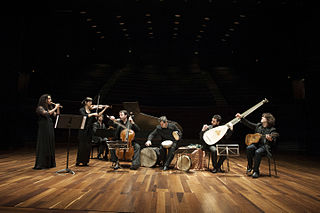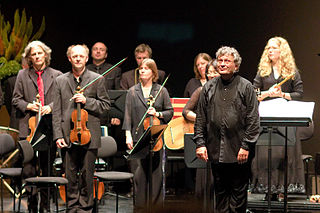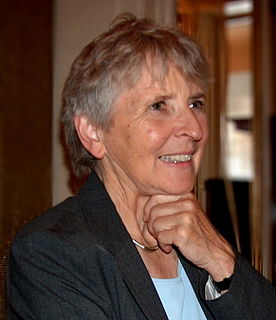Johanna Koslowsky is a German soprano and vocal coach in the field of historically informed performance.
A soprano[soˈpraːno] is a type of classical female singing voice and has the highest vocal range of all voice types. The soprano's vocal range (using scientific pitch notation) is from approximately middle C (C4) = 261 Hz to "high A" (A5) = 880 Hz in choral music, or to "soprano C" (C6, two octaves above middle C) = 1046 Hz or higher in operatic music. In four-part chorale style harmony, the soprano takes the highest part, which often encompasses the melody. The soprano voice type is generally divided into the coloratura, soubrette, lyric, spinto, and dramatic soprano.

Historically informed performance is an approach to the performance of classical music, which aims to be faithful to the approach, manner and style of the musical era in which a work was originally conceived.
Koslowsky began her vocal training with Hilde Wesselmann in Essen. [1] After graduation, she studied church music at the Hochschule für Musik Köln. She continued her studies with Bornemann in Hannover, Michaela Krämer in Düsseldorf and René Jacobs in Basel.

Essen is the central and second largest city of the Ruhr, the largest urban area in Germany. Its population of 583,393 makes it the ninth largest city of Germany, as well as the fourth largest city of the federal state of North Rhine-Westphalia. On the Ruhr and Emscher rivers, Essen geographically is part of the Rhineland and the larger Rhine-Ruhr Metropolitan Region. The Ruhrdeutsch regiolect spoken in the region has strong influences of both Low German (Westphalian) and Low Franconian.

René Jacobs is a Belgian musician. He came to fame as a countertenor but in recent years has become renowned as a conductor of Baroque and early Classical opera.
She specializes in music before 1800 and is a permanent member of the vocal ensemble Cantus Cölln. [1] She is married to Konrad Junghänel, the conductor. The group appeared together with the ensemble Akademie für Alte Musik Berlin, Musica Alta Ripa, Musica Antiqua Köln, Musica Fiata and Sequentia. Their interpretations have been aired by numerous domestic and foreign radio stations, and they have made numerous recordings. Besides her work as a soloist, she is also active as a voice teacher.
Konrad Junghänel is a German lutenist and conductor in the field of historically informed performance, the founder and director of the vocal ensemble Cantus Cölln.

Akademie für Alte Musik Berlin is a German chamber orchestra founded in East Berlin in 1982. Each year Akamus gives circa 100 concerts, ranging from small chamber works to large-scale symphonic pieces in Europe's musical centers as well as on tours in Asia, North America and South America.
Musica Alta Ripa is a musical ensemble from Hanover, specializing in Baroque music on period instruments.



